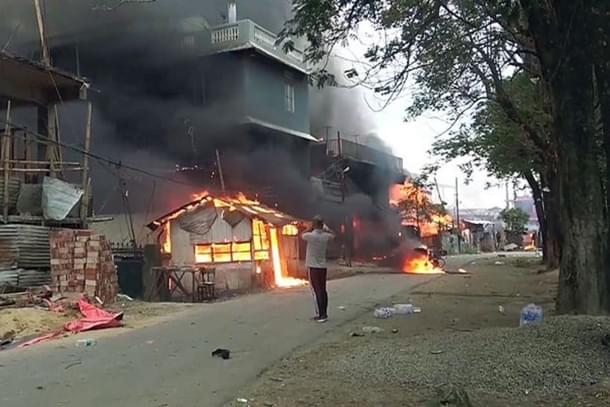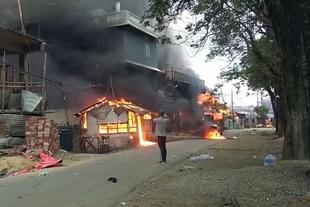North East
Explained: Why The SC’s Order On Disposal Of Bodies Of Manipur Strife Victims Is A Setback To Kuki Groups
Jaideep Mazumdar
Nov 29, 2023, 12:47 PM | Updated 12:47 PM IST
Save & read from anywhere!
Bookmark stories for easy access on any device or the Swarajya app.


The Supreme Court has ordered the burial or cremation of all the bodies — of victims of the ethnic violence in Manipur — that are lying in mortuaries.
The order is a setback to Kuki bodies that have kept the ethnic cauldron boiling by prohibiting families of those dead from claiming the bodies and conducting their last rites.
Kuki organisations like the Indigenous Tribal Leaders’ Forum (ITLF), the Joint Philanthropic Organisations (JPO) and the Kuki Inpi Manipur (KIM) have been demanding that they be allowed to conduct a mass burial ceremony at their chosen site in Churachandpur district.
The objective behind this is to inflame sentiments and, as Chief Justice of India Dhananjaya Y Chandrachud said, “keep the ethnic pot boiling”. Also, the site of the mass burial would have become a memorial of sorts and served as a permanent reminder of the Meitei-Kuki violence that has claimed (so far) 181 lives.
“Kuki organisations want to keep ethnic tensions running high and create a lasting divide between Kukis and Meiteis. Their sinister objective is to strengthen their narrative that Kukis cannot stay in Manipur and, hence, deserve a separate administration,” senior legislator K Robindro Singh told Swarajya over phone from state capital Imphal.
The Kuki bodies have, with this objective in mind, been prohibiting the bereaved families of the deceased from taking the bodies out of mortuaries and conducting their last rites.
These Kuki organisations have also stopped many (Kuki) families of the deceased from accepting the compensation offered by the state and Union governments.
Also, the ITLF, JPO and KIM have been demanding that the mass burials be allowed at a site they have chosen.
“The site chosen by the Kuki organisations in Torbung Bangla between Bishnupur and Churachandpur districts is actually land that belongs to Meiteis who had fled fearing attacks by Kukis. These Kuki organisations had wanted to grab that land illegally, and that would have inflamed passions,” said Bishnupur’s BJP MLA Govindas Konthoujam.
The Kuki bodies had attempted a mass burial of the bodies at Torbung Bangla in early August. The plan had taken Manipur on the edge (read this).
But the plan was aborted following last-minute appeals from Union Home Minister Amit Shah, Mizoram Chief Minister Zoramthanga and intervention by the Manipur High Court (read this).
A tense face-off had already ensued that time with a massive buildup of people of both the communities ready to take on each other and security forces moving in to prevent a flare-up.
The Kuki bodies have, since then, been insisting that they be allowed to go ahead with their plans to conduct the mass burial of the bodies at the disputed site at Torbung Bangla. They have been reiterating this demand at all meetings with Union government representatives and even committees set up to resolve the ethnic strife in the state.
The plan of the Kuki bodies was flagged by the Supreme Court-appointed three-member panel headed by former J&K High Court Chief Justice Gita Mittal in its latest report.
This report said (Kuki) organsiations were preventing the cremation of 88 bodies preserved in mortuaries and preventing the bereaved families from accepting ex gratia payments offered by the state and Union governments in order to keep the ethnic cauldron boiling.
The committee, which has former Bombay High Court Judge Shalini Phansalkar Joshi and former Delhi High Court Judge Asha Menon as its other members, submitted the report damning the Kuki organisations after its field visits to all Kuki and Meitei inhabited areas of the state and speaking to numerous families of victims as well as all stake-holders.
The committee said that some 88 of the 94 bodies lying in three mortuaries in the state have been identified but some civil society organisations (CSOs) have been “exerting tremendous pressure” on the families of the victims not to accept the bodies.
The committee, while providing examples of bereaved families who are keen on conducting the last rites of their relatives, observed that “some CSOs are opposing and obstructing the performance of last rites by relatives on account of vested interests, and even in order to derive mileage and compel authorities to meet unwarranted demands”.
The CSOs alluded to by the committee are the three Kuki organsiations. The ‘unwarranted demands’ referred to by the committee are the demands of the Kuki bodies to allow mass burial of the bodies at the disputed site.
“Apprehensions were also expressed that there are elements interested in maintaining tensions between communities and preventing restoration of peace and harmony in the state. For this reason, true and correct facts of the matter are not being placed before the Supreme Court (by some of the petitioner NGOs),” the committee said in its report.
The allusion, once again, is to Kuki organsiations which have petitioned the Supreme Court with various demands, including that of allowing mass burial of the bodies of victims of the strife at the site at Torbung Bangla.
The committee said that the state government had earmarked nine sites for burial of the bodies and allowed the kin of the dead to choose any of the sites.
“Unfortunately, the CSOs are insisting on mass burials at unsuitable spots, which will serve as a source of constant mounting of tensions between communities in Manipur and prevent restoration of normalcy,” the report authored by the three former judges said.
The Kuki bodies have placed 50 empty coffins just outside the entrance to the office of the deputy commissioner of Churachandpur as a form of protest. Meetings are regularly held by the Kuki bodies in front of these empty coffins.
“Inflammatory and communal speeches are made at these meetings. Symbolic homage is paid to the victims by placing wreaths on the coffins and this serves as a constant reminder to all about the unfortunate violence that has engulfed our state,” Manipur Law Minister Thounaojam Basanta Singh told Swarajya over phone from Imphal.
The Supreme Court-appointed committee also referred to this and said that the coffins serve as a “constant source of deep pain and agony for those who have lost their near and dear ones”.
“At the same time, it is extremely demoralising for state government officials who have been rendering round the clock service to the displaced populations and making every possible effort for bringing normalcy to their lives. The display of coffins is providing a never-ending instigation of angst and tension for inhabitants of the district,” the committee said in its report.
The committee requested the Supreme Court to direct the (Kuki) CSOs not to interfere in the acceptance of ex gratia and allow the bodies to be taken performance of the last rites by relatives.
If the bodies are not accepted by the relatives within a specified time frame, the state authorities should be directed to carry out the last rites free of charge, the committee recommended.
The SC’s acceptance of these recommendations is a setback to the Kuki bodies. Stating that it cannot allow to keep the (ethnic) pot boiling, the SC ordered that failure of the relatives of the victims to accept the bodies and conduct the last rites at any of the nine spots designated by the state government will pave the way for the state to conduct the last rites on its own.
The SC bench headed by Chief Justice Chandrachud and comprising Justices J B Pardiwala and Manoj Misra rejected the idea of mass burials advocated by the Kuki CSOs.
“Frankly, it appears that the idea only is to keep the pot boiling... But we don’t want the pot to keep boiling over the dead bodies. Replies, affidavits and counter affidavits etc... all that will only delay it. We can’t keep these bodies in the mortuaries indefinitely,” the bench observed.
The SC bench directed the state government to notify the next of kin of the dead (whose bodies are lying in mortuaries) on or before Monday (4 December) to collect the bodies and carry out the last rites at any of the nine designated sites latest by 11 December.
Failure of the bereaved families to collect the bodies and conduct the last rites will allow the state to do the same on its own, the SC bench said.
The SC also asked Solicitor General Tushar Mehta, who was appearing for the Centre, to see to it that empty coffins kept in front of the Churachandpur deputy commissioner’s office be removed immediately.
The Solicitor General was also asked to devise modalities, including direct benefit transfer (DBT), so that compensation (ex gratia) to the bereaved families (who have been forced by the Kuki organisations against accepting the compensation) can be disbursed.
Manipur On The Edge Again As Meiteis And Kukis Head Towards Fresh Stand-Off





